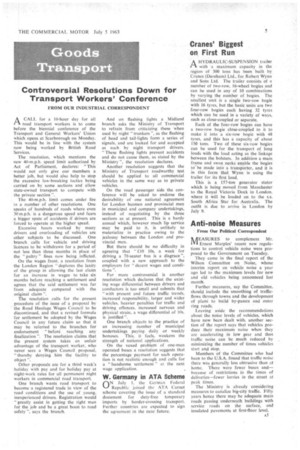Controversial Resolutions Down for Transport Workers' Conference
Page 7

If you've noticed an error in this article please click here to report it so we can fix it.
FROM OUR INDUSTRIAL CORRFSPONDENT
ACALL for a 10-hour day for all
road transport workers is to come before the biennial conference of the Transport and General Workers' Union which opens at Scarborough on Monday. This would be in line with the system now being worked by British Road Services.
The resolution, which mentions the new 40-m.p.h. speed limit authorized by Act of Parliament. declares: This would not only give our members a better job, but would also help to stop the excessive law-breaking tactics being carried on by some sections and allow state-owned transport to compete with the private section The 40-m.p.h. limit comes under fire in a number of other resolutions. One speaks of hundreds of roads where even 30 m.p.h. is a dangerous speed and fears a bigger spate of accidents if drivers are forced to operate at the higher speed.
Excessive hours worked by many drivers and overloading of vehicles are other subjects to be discussed. One branch calls for vehicle and driving licences to be withdrawn for a period of not less than three months in place of the "paltry" fines now being inflicted.
On the wages front, a resolution from the London Region "deplores the laxity of the group in allowing the last claim for an increase in wages to take six months before reaching a settlement and agrees that the said settlement was far from adequate compared with the original claim ".
The resolution calls for the present procedure of the issue of a proposal by the Road Haulage Wages Council to be discontinued, and that a revised formula for settlement be adopted by the Wages Council in any future claim so that it may be referred to the branches for endorsement "before reaching any finalization ". The resolution claims that the present system takes an unfair advantage of the transport worker, who never sees a Wages Council proposal, " thereby denying him the facility to object ".
Other proposals are for a third week's holiday with pay and for holiday pay at night-work rates for all permanent night workers in commercial road transport.
One branch wants road transport to become a registered trade in view of the road conditions and the use of young. inexperienced drivers. Registration would "greatly assist in getting the right man for the job and be a great boon to road safety '", says the branch. And on flashing lights a Midland branch asks the Ministry of Transport to refrain from criticizing these when used by night " trunkers", as the flashing of head and tail-lights form a series of signals, and arc looked for and accepted as such by night transport drivers. "These flashing lights prevent accidents and do not cause them, as stated by the Ministry", the resolution declares.
Another resolution suggests that the Ministry of Transport roadworthy test should be applied to all commercial vehicles in the same way as to private vehicles.
On the road passenger side the conference will be asked to endorse the desirability of one national agreement for London busmen and provincial men in municipal and company undertakings, instead of negotiating by the three sections as at present. This is a hardy annual which, however much lip service may be paid to it. is unlikely to materialize in practice owing to the jealousy between the London and provincial men.
But there should be no difficulty in agreeing that "£10 I0s. a week for driving a 78-seater bus is a disgrace", coupled with a new approach to the employers for "decent wages and conditions".
Far more controversial is another resolution which declares that the existing wage differential between drivers and conductors is too small and submits that "with present and future traffic trends, increased responsibility, larger and wider vehicles, heavier penalties for traffic and driving offences. increased nervous and physical strain, a wage differential of 10s. is justified One branch objects to the practice of an increasing number of municipal undertakings paying daily or weekly bonuses. This, it feels, weakens the strength of national applications.
On the vexed problem of one-man operated buses a resolution suggests that the percentage payment for such operation is not realistic enough and calls for a "handsome settlement" at the next wage application.
W. Germany in ATA Scheme ON July 1, the German Fcdcral Republic joined the ATA Carnet scheme covering the issue of a standard document for duty-free temporary imports by border-crossing transport. Further countries are expected to sign the agreement in the near future.












































































































